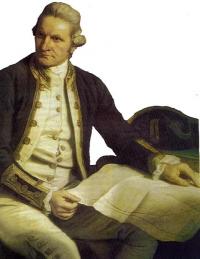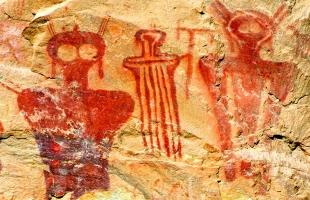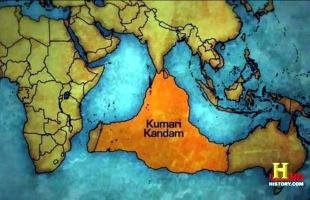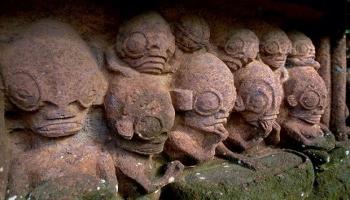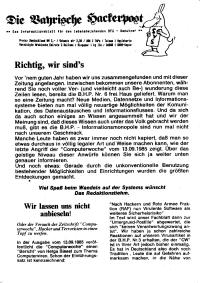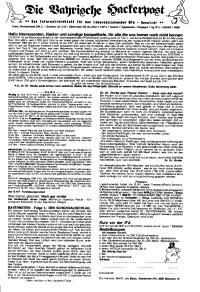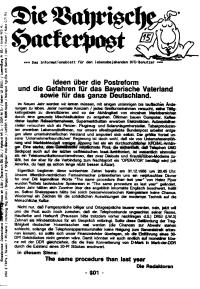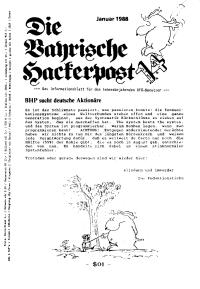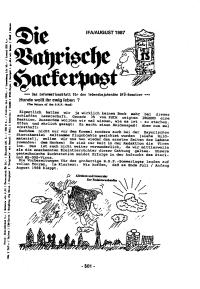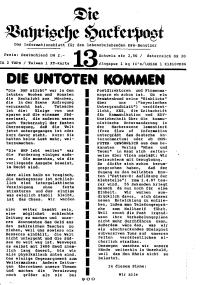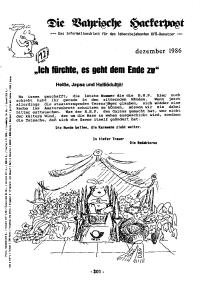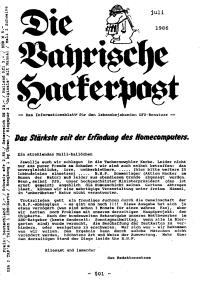23 - 1912--The parties in disarray

Via The NY Transfer News Service * All the News that Doesn't Fit
How Capitalists Rule
The Republocrats Series:
Part 23:
1912--THE PARTIES IN DISARRAY
By Vince Copeland
ROCKEFELLER FOR TAFT
John D. Rockefeller publicly declared his support for William Howard Taft almost the moment Taft got the Republican nomination in 1908. This was motivated as much by the Democratic candidacy of William Jennings Bryan as by Rockefeller's belief that Taft would be kind to Standard Oil.
The Morgan group came through with hefty campaign donations for Taft. The J.P. Morgan Co. itself gave $20,000, Andrew Carnegie another $20,000. E.T. Stotesbury, a Morgan partner and future father-in-law of Gen. Douglas MacArthur, gave $15,000; Frank Munsey, the publisher and stock market manipulator, and George Perkins, the ex-partner but still Morgan-oriented amateur politician, $5,000 each. And so on and so on.
The stock market went up when Taft took the oath of office as president and the financial fraternity felt that the country was in good hands at that point. Theodore Roosevelt felt the new president would continue to carry out his policies, and Taft was very grateful to Roosevelt for practically bestowing the presidency upon him. But in a few months there was a cooling off in the friendship of the two men and Taft was in trouble as president.
What went wrong in his relationship with Roosevelt?
It was not that Taft stopped Roosevelt's anti-trust campaign. As a matter of fact, his administration initiated suits against 45 trusts, as against Roosevelt's 25. But he made less noise about it and aimed at different trusts.
Ferdinand Lundberg ("America's 60 Families") and others show that Taft favored Rockefeller over Morgan. Both were Republicans but were nevertheless in sharp competition in some fields. The breakup of the Standard Oil trust, which did not hurt the Rockefeller fortune although it checked the growth of his oil company somewhat, was not due to any act or policy inaugurated by Taft.
It appears that Taft actually tried to carry out the Roosevelt policies. He at first identified himself with the so-called "insurgent" Senators who were sponsoring legislation for corporate regulation and conservation. But his instincts and his methods were in another field altogether. His associations were closer to the Rockefellers and some of the more reactionary in big business. And he shrank from the kind of fighting and posturing that Roosevelt was so happy with.
HIS COLONEL BLIMP PERSONALITY
Taft's dignity was important to him. And thankful as he was to Roosevelt for the chance to be president, he insisted upon living the same life and conducting himself in the same way he had in private. This was not fundamental, perhaps, and did not upset most Republicans. But it indicates a human obstacle in the course of government.
"Plagued by the rebellious progressive Republicans, who were infuriated by ... the general abandonment of Roosevelt's policies, Taft indulged in furtive golf games with Henry Clay Frick [a reactionary lord of the steel industry] as the summer of 1910 wore on." Mrs. Taft had "prevented Will from playing golf with John D. Rockefeller the year before--all felt that `Frick is a bad name to have coupled with that of the president.' Taft stubbornly insisted that `he likes Frick and there is an end to what one can say or do in matters of this kind.'" (William Manners, "TR & Will," p. 174)
This change in style was also a change in substance. Fully as convinced an imperialist as Roosevelt, he lacked his predecessor's broader understanding of government and had no feel for active politics, not to mention effective demagogy.
He hardly blinked at the wildly protectionist Payne-Aldrich Act that raised the tariff on 600 items, signing it as "a fine piece of legislation." He liked Senator Aldrich personally, even though the latter had been thoroughly excoriated and exposed in the Hearst press as a venal politician in the direct pay of big business.
At one point he entertained Aldrich, his daughter Abby and Aldrich's son-in-law, John D. Rockefeller, Jr., in the White House. But he let them in by a back door and told the guard not to register them as guests for that day, so he was well aware of the unpopularity of his action.
ALASKAN MINES AND WALL STREET MINERS
The falling-out with Roosevelt that received the most publicity was the dispute between Secretary of the Interior Ballinger and Chief Forester Gifford Pinchot, a close friend of Roosevelt. It was over the disposition of extensive coal-mining lands in Alaska. Ballinger wanted to give them to the Guggenheims and the Morgans. Pinchot vigorously opposed this.
This would make it appear that Roosevelt, who sided with Pinchot, was in reality opposing the Morgan interests and that this underlay his dispute with Taft. But there was a bigger dispute that was less publicized. This was Taft's action against U.S. Steel's acquisition of the Tennessee Coal and Iron Company. U.S. Steel at that time was the biggest jewel in the Morgan crown.
Roosevelt was particularly incensed because Taft had voted for the merger of the two companies when he was Roosevelt's Secretary of War. This is given as the main reason for his difference with Taft, especially by Lundberg who, as a former financial news writer, was very well informed on these things.
There can be no doubt whatsoever that TR had to listen to many private complaints about the Taft action on U.S. Steel and queries as to why he could not control Taft in this field.
In any case, the general liberal view that Taft and TR's friendship had cooled simply because Taft revealed himself to be a conservative plodder does not hold much water.
The truth may well be that Roosevelt knew Taft very well indeed and expected that after eight years of Taft, the people would turn to him, Roosevelt, as the modern savior against the big corporations and trusts. But he also thought that Taft would ask his advice on all the big things that could hurt the Morgan interests, like the U.S. Steel-Tennessee Coal and Iron affair, the International Harvester deal and, in a different way, the proposed Alaska coal giveaway. This did not happen, or happened only for a short period.
Taft's weak political thrust did indeed make him a voice for Roosevelt, but only at first. Later he became a voice for other elements, including his own plodding, conservative self. Roosevelt could not use him as his alter ego, as he undoubtedly had expected to do. Thus, maneuver politics has its limitations in great affairs, even when practiced by the mighty.
At any rate, Roosevelt's attempt in 1912 first to take the Republican nomination away from Taft and then, when that failed, to run independently on the Progressive Party ticket must have been motivated by very strong considerations, in which ego played its part but was not fundamental, since he must have thought he could run in 1916 with a much greater chance of victory.
Nevertheless, we find him in 1912 divorcing himself from the Republican Party. With all his undoubtedly great talent for politics, with all his great popularity, some of it well deserved, and with all his ego and his talent for listening to the political pulse of the people, how could he have made such a grievous mistake?
ELECTION OF 1912
The election of 1912 was a complicated and exciting affair, quite different from most previous contests (except 1860 and 1896). For one thing, there were three major candidates plus the Socialist nominee. And every candidate in the election appeared to be pro-labor, although nobody but the Socialists paid much attention to Black Freedom.
Roosevelt ran this time on the Progressive Party ticket, surpassing his erstwhile friend and fellow Republican Taft by more than 18 percent of the vote. But Democrat Woodrow Wilson received the palm of victory, and with all the lofty grace that was his political trademark.
Eugene Debs polled 900,672 votes for socialism, more than doubling his showing of 1908. The Socialist Labor Party (which had predated the Debs Socialists by a couple of decades but was now taking a sectarian position on several burning issues) polled 28,750.
The Prohibition Party received 206,275 as opposed to 253,840 in 1908.
Roosevelt's Progressive Party--or "Bull Moose" as it was popularly called--split the Republican vote, leaving the party (now called "the Wreck") to bind itself together over the next eight years.
Clearly the hold of big business on the parties was at least somewhat in disarray. And almost just as clearly the popular upheavals were making themselves felt in the programs and activities of the parties, big and small.
CLASS STRUGGLE AND SOCIALIST PRESSURE
As the reader might well suspect, the pressure of mass protest, struggle, strikes and class conflict was making itself felt, however faintly or unsuccessfully, in the corporate boardrooms and election boards of the country.
The big moguls of the United States had plenty to worry about in the face of a more and more radicalized electorate. The Socialist vote of over 900,000 was especially impressive given that the incumbent President got 3.5 million and Roosevelt himself 4.1 million votes.
When one considers the miniscule size of the socialist campaign funds, the hostility of all the big newspapers, not to mention the magazines, college faculties and big churches, this showing of close to a million votes is all the more remarkable.
One writer observed recently that "... much of the activity for progressive reform was intended to head off socialism. [One authority] talked of `the presence of Socialism as evidenced by its growth in colleges, churches, newspapers.' In 1920 Victor Berger became the first member of the Socialist Party elected to Congress; in 1911, seventy-three Socialist mayors were elected, and 1,200 lesser officials in 340 cities and towns. The big press spoke of the rising tide of Socialism in the United States." (Howard Zinn, "A People's History of the United States," Longman, New York, 1980, p. 346)
But behind all the optimistic figures and radical flurry were some very cynical and hard-boiled calculations, which have to be aired and understood if we are to form any opinion of big political party development in the 20th century.
A PROBLEM FOR BIG BUSINESS
As 1912 dawned upon the electoral arena, the leaders of big business were still confronted with a Democratic Party in partial revolt, a party that, strictly speaking, was not under control. When Bryan declined to run in 1904 and supported the conservative Judge Alton Parker, it was an attempt to patch things up with the Eastern Establishment. But it was by no means a complete rapprochement or the surrender of the party's new radicalism. This was made more evident by Bryan's third candidacy in 1908.
True, Bryan's 1908 program was hardly more radical--in words--than Roosevelt's had been. But it was coming from a different .MDBO/class.MDNM/ and would be implemented by a different class if it were to be victorious in the election. It is also true that much of the Eastern Establishment spoke well of Bryan by 1912, but few of them would support him. And lurking beneath the surface, ready to break out anew, was always the battle cry of "Down with Wall Street!"
On the other hand, Theodore Roosevelt was not exactly what big business viewed as the ideal president, either. He had become so popular and so identified with the Republican Party that much of Wall Street would have pinned a medal on any lion that finished him off when he embarked on an African safari right after his exit from the presidency. (One of the tycoons is supposed to have said: "I hope the first lion he meets does his duty.")
J.P. Morgan, in particular, whose minions had helped his early political career so much, was incensed at Roosevelt personally, and regarded him as an ingrate for his (mostly verbal) attacks on Morgan businesses. But Morgan was smart enough to conceal or soft-pedal his opposition in the light of TR's extreme popularity.
Notwithstanding many impartial estimates that Roosevelt had been basically good for business and certainly was a strong and aggressive leader of U.S. business in the field of foreign policy, the question for them was how to get rid of Bryan and Bryanism in the Democratic Party and how to cut Roosevelt and Rooseveltism out of the Republican Party.
(Copyright Workers World Service: Permission to reprint granted if source is cited. For more info contact Workers World, 46 W. 21 St., New York, NY 10010; "workers" on PeaceNet; on Internet: "workers@mcimail.com".)
NY Transfer News Service * All the News that Doesn't Fit
Modem: 718-448-2358 * Internet: nytransfer@igc.apc.org












